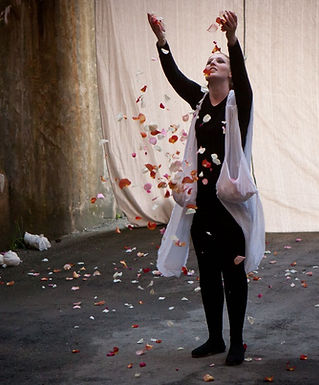
Mission

MISSION
The Ritual Theatre creates original, site-specific, transformational
theatre for diverse inter-generational audiences. Our performances offer space for the emergence of authentic community, and seek to restore our much-needed connection with ritual and with place. Through site specific plays, installation-performances and other multidisciplinary work, we hope to nurture the inspired potential within each of us, and to deeply celebrate the cycles of love, loss
& renewal that make us human.
.
Ritual, Liminality & Transformation
We believe that the ritual function of theatre is a necessary part of evolving a more healthy, sane, loving, and just society.
Theatre is education. Theatre is healing. Theatre is transformation. Theatre can build community, and help us remake society in our true likeness. And we believe that hidden underneath our collective amnesia, we all have a desire to feel more deeply connected through ritual spaces.
So it is that we cultivate containers in which the liminal might be tempted to happen. We invite this through technologies of theatre, storytelling & dance - as humans have for countless ages - with humility and with hope that that same ancient and much-needed magic might grace our offerings and our lives. Ultimately this alchemy happens inside each of us, as well as between us within a permeable space that is created as much by the actors as by the audience.


What is Ritual?
A ritual is as an offering by an individual or group to the larger Universe, with the conscious intention to connect to our original state of interconnectedness or inter-being. This kind of offering is an expression of gratitude to Life itself, to our Ancestors, to Nature, and for the future generations.
Through ritual, we link the micro to the macrocosm - the experience or story of the isolated individual to that of the Collective. We re-member that the work of living a human life is both a solitary & shared effort.
In ritual we also make space for paradox: for the sacred & profane, the ugly & the beautiful, impermanence & eternity, and the vast expanse of human emotion & longing. In honoring our deepest desires and our most profound shadows, we encourage others to do the same.
The Ritual Theatre continues a lineage of remembrance inspired in particular by South Indian traditions which honor theatre, dance & music along with all forms of art-making as aspects which when seamlessly woven together, produce what we like to call "a whole work of art". The notion of artistic disciplines being separate entities is not only foreign but unnatural to pre-colonial traditions around the Globe. It is impossible to actually separate "theatre" from "dance", "performance" or "ritual". Instead, these are each recognized as aspects of a unified expression; any given form speaking through its own unique language.
In Kerala, South India the term for all ritual arts is "nāden kāla" which translates to "arts of the land" , meaning that they sprang from and exist in relationship with the land and its people as part of a whole way of life. From their origins, ritual theatre forms took place site-specifically within sacred groves, agricultural fields, cremation grounds and temples and in relation to the spirits of the land or to one's ancestors. To have art & culture of one's own is to "play" ("kāla") in relationship with the rich textures of nature, place & peoples over a long period of time - one in which culture/art evolves, as our interdependent relationships deepen.
Decolonizing theatre in the West also calls for a profound honoring of the ritual performance traditions of People of Color of the Global Majority without appropriating them as yet another mode of unconscious extraction. As a WOC-founded company, and one of the first to coin the term "ritual theatre"in the US, we celebrate the work of BIPOC artists & performers, while also encouraging all of us to carry out the necessary work of ancestral healing & recovery.


Decolonizing Theatre

Re-membering a Village Way of Life
Our ultimate intention in creating ritual theatre is to help reclaim "a village way of life" - one in which the arts are fundamental to the creation & maintenance of an authentic culture of place and community. In order to do this, we must first redefine what constitutes theatre, who makes it, who goes to see it, and why.
In pre-colonial traditions, artists were regarded as sacred emissaries of the Divine. The entire village - from infants to the elderly - would go out to experience annual ritual theatre which occurred in cyclic relationship to the sun, moon & stars. For both artists & audiences, the art & theatre were practices of re-membering their relationship as part of a greater Whole. Artists were sustained through patronage models embedded in the fabric of society, making performances free to all.
In contrast to this, in the industrialized, capitalized world, artists find themselves marginalized, as the arts themselves are regarded as an accessory rather than as an intrinsic or sacred part of life. Theatre is most often the providence of the elite - those who can afford (time & money) to go out and see/consume it as a temporary escape from daily life.
These are two starkly different paradigms:
One, self-arising & regenerative. The other, colonized & extractive.
Our work is to reclaim the former.
Honoring the Land
The Ritual Theatre has been based in the lands of the Mahican Nation,
in what is presently called "The Berkshires, Western Massachusetts" on Turtle Island.
We acknowledge that these are stolen lands, and seek to honor the memory & presence of
Indigenous ancestors and their descendants through our work in creating a place-based culture.